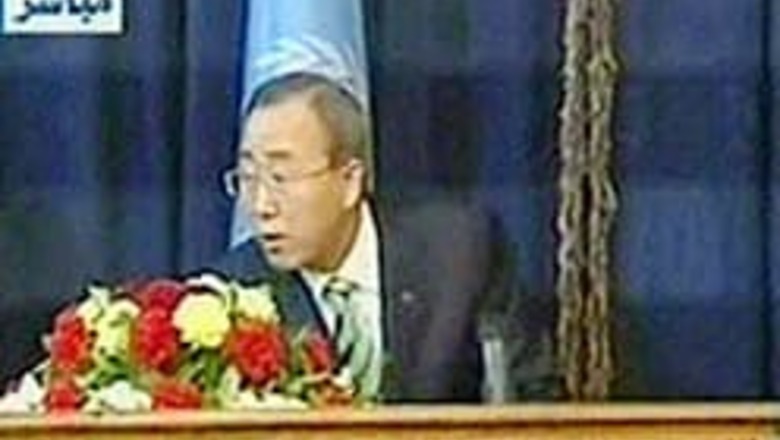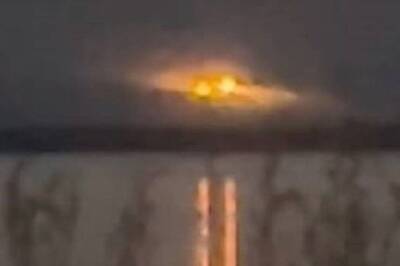
views
Baghdad: UN Secretary-General Ban Ki-moon was unharmed but ducked behind the podium after a rocket landed near Prime Minister Nouri al-Maliki's office on Thursday while the two men were speaking to reporters at a news conference.
The attack came as Prime Minister Nouri al-Maliki's government said it had been negotiating with Sunni insurgents for months, and the US military said that it had released a senior aide to Shiite cleric Muqtada al-Sadr on al-Maliki's request.
The rocket caused no injuries but rattled the building in the heavily guarded Green Zone, sent small chips of debris floating from the ceiling, and left a three-foot-wide crater about 50 yards away outside.
It struck right after al-Maliki, standing next to Ban, had finished telling reporters that Ban's visit was a sign that Iraq was on the road to stability.
''We consider it a positive message to the world in which you confirm that Baghdad has returned to playing host to important world figures because it has made huge strides on the road toward stability,'' al-Maliki said in his opening remarks.
Ban had just finished giving an answer to question and it was being translated into Arabic as the rocket struck with a big explosion.
He appeared frightened, casting his eyes right and left as he rose after ducking behind the podium where he was standing and answering questions with al-Maliki. A worried-looking Ban turned to one of his aides and asked: ''Is it OK?''
Al-Maliki told his security guards, ''Nothing's wrong,'' as one of them moved to grab him. He then proceeded to answer a question and while that response was being translated, he turned to Ban and asked: ''That's enough?'' ''Yes,'' he replied.
The last visit to Iraq by the head of the UN was in November 2005, by Ban's predecessor, Kofi Annan.
The United Nations headquarters in Baghdad was bombed by militants on Aug. 19, 2003, and 22 people died, including the top UN envoy, Sergio Vieira de Mello. The UN's international staff withdrew from Iraq in October 2003 following a second assault on its offices and other attacks on humanitarian workers. A small staff has gradually been allowed to return since August 2004.
PAGE_BREAK
The US said it believed that the peace process could be helped by Ahmed al-Shibani, who was captured in the holy Shiite city of Najaf during fierce clashes in 2004 between US forces and al-Sadr's Mahdi Army militia, which has largely cooperated with a new security push by US and Iraqi forces.
The government released a photograph showing al-Maliki receiving a smiling al-Shibani at his office, underlining the close ties between the prime minister and al-Sadr. Al-Sadr's support kept al-Maliki in his job last year, since the cleric's loyalists have 30 of parliament's 275 seats and six Cabinet posts.
The US military said it had determined that al-Shibani ''could play a potentially important role in helping to moderate extremism and foster reconciliation in Iraq.''
Authorities imposed an indefinite curfew on the southern city of Basra after clashes between the Mahdi Army and the rival Shiite Fadhila party, which recently withdrew from al-Maliki's government.
The continuing rivalry in the oil-rich region poses the most serious threat to the unity of Iraq's majority Shiites.
Police said the Mahdi militiamen fought Fadhila guards outside party headquarters, capturing eight before the building caught fire. Twelve Mahdi Army fighters were wounded, they said.
Clashes also erupted near the residence of Basra's Fadhila governor, Mohammed al-Waeli, and continued into the afternoon, police said.
The clashes came days after British forces pulled out of their main base in the heart of Basra.
The US military announced that it had captured the leaders of a Shiite insurgent network ''directly connected'' to the killing in January of five American soldiers in the holy city of Karbala by gunmen speaking English, wearing US military uniforms and carrying American weapons.
The military said the arrests of Qais Khazaali, his brother Laith Khazaali and several other members of the network took place over the past three days.




















Comments
0 comment